Place: Coronation Block / Shanghai Restaurant
Address: 236 - 238 King Street (Map)
Constructed: 1882 - 83
Architects: Victor Stewart, J H G Russell
Status: Facing Demolition
The Coronation Block began life as the Robert Block on the newly christened King Street. (The year construction started on the building Annie and Maria Streets were joined at the Market Building to form the new through-street.)

The first owner of the building was pioneer merchant and politician John Higgins. The first notable early tenant was the City of Winnipeg as the block was used to house civic offices while the 'Gingerbread House' city hall was being constructed i n 1885.
Other tenants between 1884 and 1897 included: Harris, Bayne and Young Land Surveyors; the Women's Christian Temperance Union (1887); a hardware / tinsmith shop; a seed seller and the Ashely Corset Factory. Beginning around 1890 living quarters were advertised.
Higgins died on November 22, 1884 but his estate held onto his properties until April 1892 before starting to sell them off. I can't find a mention of who bought it. The name change from Robert Block to Coronation Block likely came in 1902, after the coronation of Edward VII.
The Nanking Chop Suey House was a fixture in the Coronation Block from 1929 until 1940 when it moved to 257 King to become the "New Nanking". Their space wouldn't be empty for long, though.
The Shanghai Chop Suey House first opened just up the street at 224 King at Pacific on September 21, 1935. Business was good and on December 21, 1935 they opened a 'tea garden' upstairs. The tea garden was actually a dance hall and proprietor Charles Wong found himself in court a number of times charged with operating a hall without a license, being open after hours and once even for staging a musical without the Toronto playwright's permission !
On November 13, 1941 the Shanghai moved into the old Nanking space in the Coronation Block and became known as the "New Shanghai Chop Suey House."
In the summer of 1958 the Shanghai restaurant underwent a major renovation and expansion that included the addition of the mosaic located outside the front door and the addition of the Sai-Woo Dining Room by knocking through to the neighbouring retail space.
Constructed: 1882 - 83
Architects: Victor Stewart, J H G Russell
Status: Facing Demolition
Source: buflyer
The Coronation Block began life as the Robert Block on the newly christened King Street. (The year construction started on the building Annie and Maria Streets were joined at the Market Building to form the new through-street.)

The first owner of the building was pioneer merchant and politician John Higgins. The first notable early tenant was the City of Winnipeg as the block was used to house civic offices while the 'Gingerbread House' city hall was being constructed i n 1885.
Other tenants between 1884 and 1897 included: Harris, Bayne and Young Land Surveyors; the Women's Christian Temperance Union (1887); a hardware / tinsmith shop; a seed seller and the Ashely Corset Factory. Beginning around 1890 living quarters were advertised.
Higgins died on November 22, 1884 but his estate held onto his properties until April 1892 before starting to sell them off. I can't find a mention of who bought it. The name change from Robert Block to Coronation Block likely came in 1902, after the coronation of Edward VII.
The Nanking Chop Suey House was a fixture in the Coronation Block from 1929 until 1940 when it moved to 257 King to become the "New Nanking". Their space wouldn't be empty for long, though.
December 21, 1935, Manitoba Free Press
The Shanghai Chop Suey House first opened just up the street at 224 King at Pacific on September 21, 1935. Business was good and on December 21, 1935 they opened a 'tea garden' upstairs. The tea garden was actually a dance hall and proprietor Charles Wong found himself in court a number of times charged with operating a hall without a license, being open after hours and once even for staging a musical without the Toronto playwright's permission !
On November 13, 1941 the Shanghai moved into the old Nanking space in the Coronation Block and became known as the "New Shanghai Chop Suey House."
In the summer of 1958 the Shanghai restaurant underwent a major renovation and expansion that included the addition of the mosaic located outside the front door and the addition of the Sai-Woo Dining Room by knocking through to the neighbouring retail space.
Ca. 1986, U of M Building Index
The Shanghai continued to be a popular restaurant into the 2000s. In December 2010, however, the owners announced that they wanted to wind down the business and sell the building to the Chinatown Development Corporation (CDC).
The CDC claimed that the building was in a bad state of disrepair and had to be demolished. Their initial plans were for a surface parking lot and, eventually, a housing complex. City council agreed to the demolition in mid-December 2010 but on the condition that CDC first file plans and take out building permits for the new structure.
That did not happen and in July 2012 council agreed to issue a demolition permit for a vacant lot.
The CDC claimed that the building was in a bad state of disrepair and had to be demolished. Their initial plans were for a surface parking lot and, eventually, a housing complex. City council agreed to the demolition in mid-December 2010 but on the condition that CDC first file plans and take out building permits for the new structure.
That did not happen and in July 2012 council agreed to issue a demolition permit for a vacant lot.
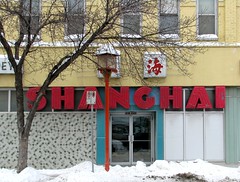
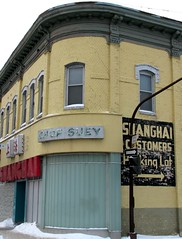
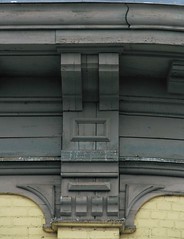
Above: ca. 2008 - 2010
Media:
Permit granted to demolish Shanghai Winnipeg Free Press (2012)
Heart of Chinatown tossed aside Winnipeg Free Press (2011)
Shanghai demo OK'ed by council Winnipeg Free Press (2010)
Shanghai Restaurant will be torn down CBC (2010)
A Bittersweet Ending National Post
228 King Street Historic Buildings Committee
228 King Street Winnipeg Building Index
UPDATE: November 2012 Demolition
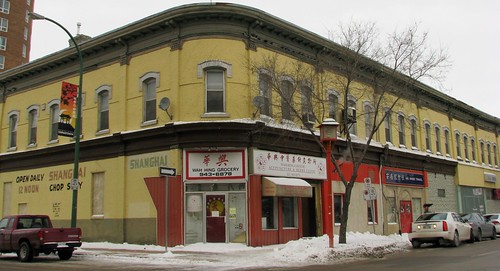








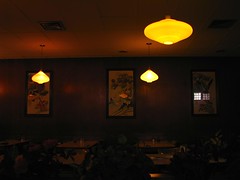
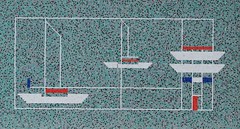



Let's see how long the lot stays empty and becomes a parking lot after the developer says there is no market for a new building.
ReplyDeleteI completely agree. There's enough abandoned buildings and empty lots in Chinatown that if there were any sort of demand for development there would have been moves made already.
ReplyDeleteSomeone's just looking to cash in on increased parking demand in the Exchange, me thinks !
We went for a last visit this evening. The food was good, and there was a steady flow of people enjoying one last visit to a kitchy Winnipeg staple.
ReplyDeleteI have to laugh at anyone who thinks this will ever be anything other than an addition to Winnipeg's generous bouquet of sandy, unimaginative, litter-strewn surface lots.
ReplyDeleteAll people from the Winnipeg suburbs want in a downtown is more parking. So that's all it will ever be.
Yes, and at one point the whole downtown will be one big parking lot then they'll complain that there's nothing to go do downtown !
ReplyDelete